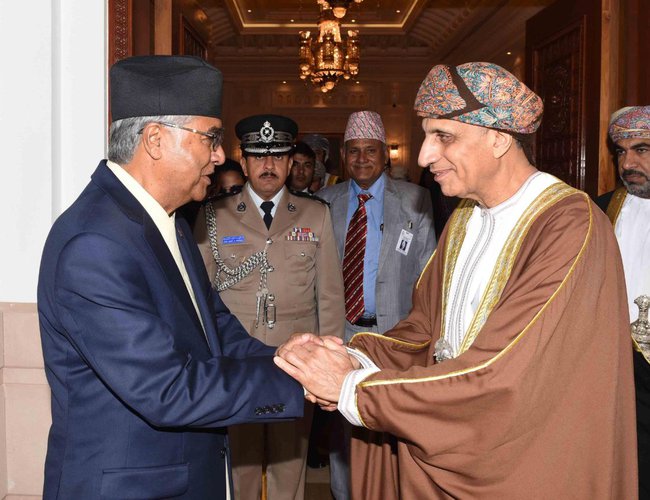
Following a three-day official visit by the Nepalese Prime Minister, Sher Bahadur Deuba to Oman which concluded last week, both countries are in final talks to reach an agreement on mutual visa exemption for holders of diplomatic passports.
The two countries also signed a Memorandum of Understanding (MoU) on establishing a bilateral consultation mechanism between foreign affairs ministries of both countries.
Prime Minister Deuba said the main focus of the talks was to invite investors. “Our main focus of investments is hydropower development,” said PM Deuba in an interview with Muscat Daily recently.
“We invite investors from Oman to help Nepal develop hydropower project and we are keen in supporting this kind of investment. In addition, Omani businessmen can explore options in agriculture, trade, and tourism in Nepal.”
PM Deuba added, “My visit to Oman is meant to take the relations between our countries to the next level. We just signed a MoU on establishing bilateral consultation mechanism and I am happy to say that we are now trying to finalize our agreement on waiving the visa requirements for diplomatic passport holders of both our countries.”
PM Deuba affirmed that this visit came to push the relations between the two countries in trade, agricultural, educational and health areas, as well as exchanging business delegations, particularly investment in hydro projects. Remittances from workers living abroad account for 30 percent of Nepal's GDP. It has three areas of comparative advantage – hydropower, tourism and some agricultural products.
He added, “Because Nepal has good relations with India and China, it is a good opportunity for Oman to invest in Nepal which can be a good gateway for Omani investments to India and China. We are keen to fully support Omani investors in this regard,”
Shanker D Bairagi, foreign secretary at Nepal's Ministry of Foreign Affairs said there would be negotiations to regulate employment and labor issues.
“There are 16,000 migrant workers in Oman and who are supporting their families back home. So, we need to make sure they are well and need to be taken care of and we are working on that,” he said.
When asked about the ban on recruiting housemaids, Bairagi said, “The maid ban was not to prevent them from going abroad but to control exploitation. We need to create a good environment for them to work. Job creation is our number one priority and that is why we invite more investments in Nepal.”
With regards to how the political developments and changes in leadership every now and then in Nepal would affect foreign investors, Dinesh Bhattarai, Foreign Affairs advisor to the Prime Minister said that foreign policy of any country is dictated by the interest of its people.
“Foreign policy remains permanent. We are a democratic country and change of government is the dynamics of democracy. “So the change of government does not affect relations with any foreign country and we follow and believe in multipolarity. Irrespective of change of governments, our interests continue to be same as far as Nepal's foreign policy is concerned,” he said.
Meanwhile, Nepal's Ambassador to Oman Sharmila Parajuli Dhakal, said, “As Nepal and Oman mark the 40th anniversary of the establishment of bilateral relations this year, the conclusion of the MoU reflects the determination of the two governments to enhance and activate different fields of cooperation, particularly on economic, cultural, technological, scientific and educational relations.”
The MoU that was signed last week provides that bilateral meetings be organised on an annual basis or as deemed necessary, alternately in Muscat and in Kathmandu. It comes into force from the date of its signature for a period of five years and is automatically renewable for similar periods.
- TANAHU HYDROPOWER PROEJCT: A Significant Achievement
- Apr 15, 2024
- AMBASSADOR HANAN GODAR: Sharing Pain With A Nepali Family
- Mar 30, 2024
- VISIT OF KfW AND EIB TO NEPAL : Mission Matters
- Mar 25, 2024
- NEPAL BRITAIN SOCIETY: Pratima Pande's Leadership
- Mar 24, 2024
- NEPAL ARMY DAY: Time To Recall Glory
- Mar 15, 2024
















